 Yesterday was J.R.R. Tolkien's birthday. I refer, of course, to the man who wrote the best novel of the 20th Century: The Lord of the Rings. And no, that fact is not up for dispute.
Yesterday was J.R.R. Tolkien's birthday. I refer, of course, to the man who wrote the best novel of the 20th Century: The Lord of the Rings. And no, that fact is not up for dispute.Or is it? Among the fantasy crowd, there's a stubborn set of naysayers who deride Tolkien's work as reactionary and cliched. There's some truth in both of these criticisms, but here's the thing: it's not really all that brave to be edgy. These days, it's more cliched to have a main character who is plagued by self-doubt, wrestles with abstract dilemmas, and is always seeking to "find himself," rather than a protagonist who is certain of anything. If they are certain of their faith, they're a religious nut job like Noah; otherwise we reshape Moses into a postmodern skeptic.
In his essay Epic Pooh, Michael Moorcock levels several bizarre potshots at the story. Firstly, he complains that Tolkien's prose is not up to snuff - and then offers up Rowling as an acceptable substitute. Enough said.
After a really weird complaint that it avoids the reality of death (Tolkien himself said the book was about death), Moorcock openly disparages its affection for the English rustic: "Like Chesterton, and other orthodox Christian writers who substituted faith for artistic rigour he [Tolkien] sees the petit bourgeoisie, the honest artisans and peasants, as the bulwark against Chaos." His mistake here is to imagine that the Shire is Tolkien's ideal society. As I've written before, it is not. Hobbiton is full of stupid, judgmental yokels afraid of the outside world. As Moorcock observes, they believe that: "Experience of life itself is dangerous." Well, it is, isn't it? But Tolkien encourages his heroes to face that danger despite the risk. Life is indeed more bloody than most hobbits think - their safety is bought at a dear price by taciturn and under-appreciated rangers. Their ignorance of this fact results in the Scouring of the Shire.
As Meriadoc Brandybuck says, right after helping a warrior princess slay an undead wraith:
‘It is best to love first what you are fitted to love, I suppose: you must start somewhere and have some roots, and the soil of the Shire is deep. Still there are things deeper and higher; and not a gaffer could tend his garden in what he calls peace but for them, whether he knows about them or not. I am glad that I know about them, a little.’
Indeed, many of Tolkien's characters must learn that the world is much bigger than they imagined, and usually this entails discovering that it is also much more spiritual than they imagined. Implied is the thought that spirituality is the opposite of certainty, the opposite of blind faith.
But it's true that Tolkien's heroes believe in certain things without question, such as the cardinal virtues. It would not occur to them to question that there is indeed good and evil in the universe. Tolkien is not intending, as a postmodern author would, to question the very fabric of reality. These things, while sometimes useful, are often pointless and produce more questions than they answer. Embracing the “beautiful chaos of reality” usually means being too mentally lazy to take a risk and risk an answer.
Like so:
Maybe this is conservative, but conservatism is relative. Looked at that way, The Lord of the Rings is both conservative and radical.
"Only a Sith deals in absolutes," Mr. Kenobi? Are you absolutely sure about that?
I'd rather say, "Do...or do not. There is no try."
Of course, it's much easier to stay safely on the shore and let the little green man lift the X-wing out of the swamp. That's where we'll leave Mr. Moorcock.
Longish



No comments:
Post a Comment
WARNING: Blogger sometimes eats comments - copy before you post.